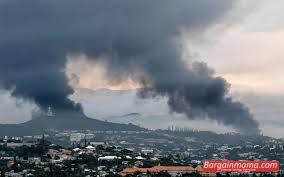In a dramatic display of local resilience and environmental activism, a small French village has taken a firm stand against a major oil corporation’s proposed extraction project. Rallying behind the slogan “Our water is vital. The oil isn’t,” residents are determined to protect their invaluable water resources, drawing widespread national and international attention.
The controversy began when representatives from a well-known oil company arrived in the region with plans to tap into nearby oil reserves. Marketed as an opportunity to bolster the local economy and promote energy independence, the project instead sparked deep concern among villagers. Community leaders and residents alike fear that the oil extraction process could severely compromise their primary water source and irreversibly harm the surrounding ecosystem.

At the core of the dispute lies a pristine river, which has long been the lifeblood of the village. This natural waterway has sustained local agriculture, nurtured diverse wildlife, and provided clean water for generations of residents. “Our water is vital,” asserted a local spokesperson at a recent community meeting. “We cannot allow profit-driven oil extraction to jeopardize our future.” Such sentiments reflect the community’s unwavering commitment to preserving their environment against potential industrial contamination.
What began as a series of intimate town hall discussions has rapidly evolved into larger public demonstrations. The villagers’ unified call—echoed in the defiant refrain “Our water is vital. The oil isn’t”—has resonated beyond local borders, symbolizing a broader pushback against environmental degradation linked to industrial exploitation. Social media has played a significant role in amplifying their message, connecting like-minded environmental advocates across Europe and beyond.
Local government officials have been compelled to address the growing public outcry. During a recent press conference, the village mayor emphasized, “We must prioritize the sustainability of our natural resources over fleeting economic gains. Protecting our water supply is an absolute necessity.” His remarks underscore the broader community sentiment: while economic development is important, it should never come at the cost of sacrificing essential natural resources.
Environmental experts have lent further weight to the villagers’ concerns. Dr. Isabelle Martin, an environmental scientist from a regional university, explained, “Oil extraction, particularly when methods like hydraulic fracturing are involved, carries significant risks of contaminating groundwater. Once a water source is compromised, restoring its purity is both challenging and costly. The proactive measures taken by this community are not only sensible—they’re imperative in today’s unpredictable environmental landscape.” Dr. Martin’s insights mirror a global conversation on the need to balance industrial activity with responsible environmental stewardship.
This local dispute is emblematic of a wider shift in the global energy debate. As the climate crisis intensifies, communities around the world are increasingly questioning the sustainability of fossil fuel dependence. Activists and environmentalists argue that investments should instead pivot toward renewable energy sources such as solar and wind power. The village’s defiant stance is a microcosm of this global trend, highlighting the critical importance of aligning economic policies with long-term environmental preservation.
Supporters of the oil project argue that the extraction plan promises job creation and a much-needed economic boost for a struggling region. However, critics contend that these short-term benefits are dwarfed by the potential long-term environmental and public health risks. The possibility of water contamination could lead to soaring healthcare costs, diminished agricultural yields, and a downturn in tourism—all factors that may ultimately cripple the local economy far more than a temporary oil boom ever could.
Despite the oil company’s assurances of employing advanced safety measures, skepticism remains high among residents. “We have heard promises like these before,” remarked a long-time local resident. “Our community has thrived on its natural resources for centuries, and we refuse to let them be sacrificed for quick profits.” This persistent doubt reflects a deep-rooted wariness about industrial projects that promise economic gain while potentially compromising the integrity of essential natural assets.
As the debate continues to gain momentum, it is expected to influence policy discussions at both regional and national levels. Lawmakers and regulatory bodies now face increased pressure to revisit and strengthen policies governing industrial projects, ensuring that comprehensive environmental impact assessments are mandatory. The outcome of this confrontation could set a powerful precedent for other communities facing similar challenges, potentially reshaping future strategies for resource management and energy production.
The French village’s firm rejection of the oil extraction project is more than a local protest—it is a clarion call for environmental stewardship and sustainable development. By declaring “Our water is vital. The oil isn’t,” the community is sending a resolute message that the preservation of natural resources must remain paramount. Their stand underscores a growing recognition that economic progress should not come at the expense of environmental health, particularly when it concerns a resource as fundamental as clean water.
In conclusion, this unfolding conflict serves as a stark reminder of the challenges facing communities in an era of industrial expansion and environmental uncertainty. The village’s determined resistance against big oil not only safeguards their immediate water supply but also sets a compelling example for sustainable development worldwide. As discussions on energy policy and environmental protection continue, the story of this small French village will undoubtedly inspire further debates on how to harmonize economic interests with the enduring need to protect our planet’s most critical resources.



